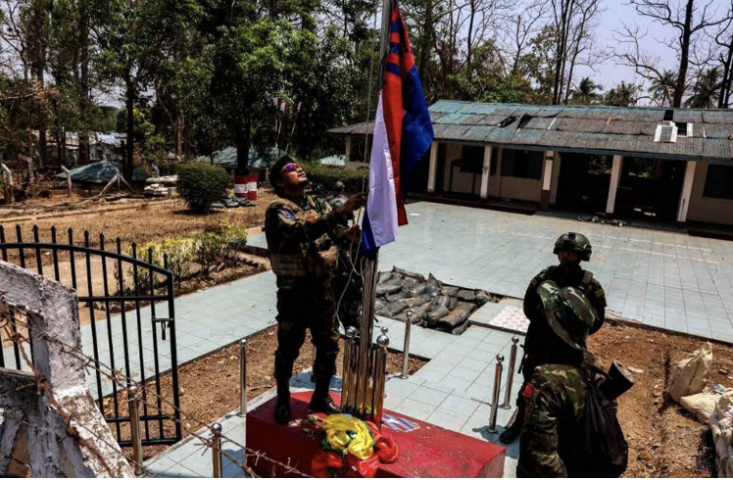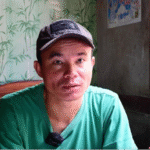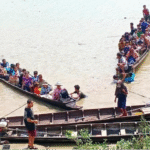An interview with a Karen political researcher about the reasons for the withdrawal of the KNLA and allied forces from Myawaddy, and the situation and crises behind Myawaddy town.
The Karen National Liberation Army (KNLA) and allied resistance forces were forced to return the junta’s last Infantry Battalion 275, which they had captured during their offensive to seize junta camps in Myawaddy. This has led to growing criticism among online users.
Regarding this situation, Karen Information Center (KIC) conducted an interview with a Karen political researcher to learn more about the reasons for the withdrawal of the KNLA and allied forces, his view on the Border Guard Force’s (BGF) open collaboration with the military council, and the situation and crises unfolding in Myawaddy town.
Q: Many lives were lost in the effort to capture the junta battalions one by one to enter Myawaddy. What could be the reasons behind the retreat from the town?
A: I’d like to explain this in two parts. First, the main actors in this battle were the People’s Defense Forces (PDFs) and the KNLA. The KNLA is under the command of the Karen National Union (KNU), and the PDF under the NUG. A place like Myawaddy is of great strategic importance. As a trade gateway to the world and situated on the Asian Highway, in this situation, the KNU/KNLA and NUG/PDF should have made prior political agreements before the military operation on issues like which side will administer which areas, and how they will handle international relations and diplomacy. This is necessary.
The reason is that, with this revolutionary strength, Myawaddy would definitely fall if the KNLA, BGF or local PDFs attack together. The BGF is facing suppression from Min Aung Hlaing’s forces. In this time of year, all junta camps can be attacked, not just IB275. It is a favorable season to attack all junta camps. So the attack was carried out with this certainty. However, after the attack, the KNU and NUG need to have made political and administrative preparations on how to proceed – not just verbal agreements but concrete implementation.
In other words, they need to have prior agreement on details, like whether certain areas will be placed under a federal government or interim government, who will manage border trade, communications and diplomacy. As far as administration is concerned, it should be agreed whether the KNU will assume responsibility. At the very least, such initial agreements are needed between the NUG and KNU. The other part is that there seems to be no clear political agreement between the NUG and KNU. The KNU has also not officially announced the Nationwide Ceasefire Agreement (NCA) is invalid. The junta continues to cling to the NCA. Given the consequences of the NCA, it is extremely difficult for the KNU to break out of the junta’s trap.
Q: What do you say to the BGF ultimately collaborating with the junta in the face of suppression from Min Aung Hlaing’s forces, in a situation where people thought they would sit on the fence?
A: The BGF is essentially a force of the junta. Whether they get paid or not doesn’t matter – it’s income and expenditure are under the junta’s control. In other words, it’s possible they also live off the income from casinos and gambling. Since they are directly or indirectly linked to the junta, it’s not that surprising. The crisis for the junta is that it had to make significant concessions in the north in its rapprochement with China.
In the south too, under pressure from China, they had to make certain commitments to take action. Because of these commitments, the suppression had to be carried out by the junta. So this pressure clearly fell on the BGF. If the junta wanted to tackle Shwe Kokko, it would have to rely on the cooperation of another group in Myawaddy. The junta needs both chicken and pork curries to get its full. So they didn’t want to let go of either side. The BGF was well aware of the junta’s weakness
.
In this situation, the BGF played in a way that if the junta wanted to take action against Shwe Kokko, it would have to give up Myawaddy as well. The military council wasn’t that naïve. There was only about 10 percent of Myawaddy left. At this point they were going to lose it. If the BGF didn’t come to the rescue, they might have been prepared to negotiate with the KNU, like in a 70:30 situation in the north. If the BGF couldn’t act up to that point, the junta was prepared to renegotiate authority with the KNU. So it’s not surprising that it turned out this way.
Q: What role could the KNU play in the current situation? What are the concerns it faces?
A: There are three crises. One is the junta’s crisis – it had to make certain commitments to China to some extent to crack down on online gambling (Kyar Phyant). In the same way, the BGF is also in crisis because of their footing on the Shwe Kokko project – they can’t afford to lose. Similarly, the KNU finds itself in this crisis too. An unforeseen crisis for them was the signing of the NCA. They didn’t think it would turn out to be a trap. They accepted it because they thought it would offer an opportunity instead of rejecting it. They are still undecided and haven’t given up on it yet. Long before the coup, the junta managed to entrap the KNU. Now they have tried to entangle the KNU with drug and online fraud issues. The KNU will have to break out of this.
There are two parts to this. First, it is too late. The NCA is now null and void. So, they should have guarded themselves from this about three years ago. Secondly, in the current situation, whether legally or procedurally, there is evidence that the KNU is involved in casino projects like the KK Park and Shwe Kokko that are considered transnational crimes internationally, even if the KNU is not directly involved. This ranges from land leasing to percentage shares to providing security. They have completely fallen into the junta’s trap, and that is a crisis. How will they get out of this? I can’t say either. All three parties are facing a crisis. To solve this crisis, third-party organizations will have to get involved, I believe.
Q: Could you elaborate on what you mean by “third parties”?
A: The first third party is China. The second is the United States, and the third is Thailand. How these three countries tackle what they call “transnational crimes” will depend on their respective strategies. In short, the opera of the play is Myawaddy, the real plot revolves around Shwe Kokko and KK Park. The upcoming actual development of the plot around Shwe Kokko and KK Park will be closely watched by these forces as well as third parties, including the international community, to see what actions are taken, and how this plot unfolds.
Q: And what about the prospects for the ongoing ground fighting?
A: It’s clear that apart from airstrikes, the junta will not advance at all. They won’t advance much on the ground. The military situation is that whether it’s the PDFs fighting the junta or the KNLA, or other Karen armed groups like the DKBA, PC, BGF in the future, they will undoubtedly emerge overtly attacking the junta. As for the military situation, we can’t predict which group will gain the upper hand, but it is certain the junta will not gain a military edge.
Q: Looking at the recent situation in Myawaddy, people are disheartened by the losses they have suffered. Is there a possibility of regaining control there? How should we look at this from an outsider’s perspective?
A: Gaining a foothold or capturing a strategic location like Myawaddy is no easy task. Even the initial capture was not easy. You need a long period to assess all aspects – the surrounding areas like Kawkareik, Wawlay, Hpalu, and the local terrain, as well as the military and political situation. The junta would not give it up easily. Myawaddy is not only important strategically but also militarily for a government in terms of international relations. This makes it difficult to capture. But this doesn’t mean the efforts to capture Myawaddy have not only recently begun. It began in 2023. Looking back, it was a strategic decision – whether to cut through Kawkareik first, or take the surrounding areas like Hpalu, Wawlay, or Shwe Kokko first.
The attempt to capture Myawaddy had already begun in 2023. The resistance forces were already advancing. For this reason, many lives had been lost in the strategic approach to capture Myawaddy starting from 2023. Finally reaching the stage of capturing Infantry Battalion 275 and getting their weapons was no easy task. However, the fact that it was returned so easily and without a fight has disheartened the public.
To put it more clearly, just as it was returned without a single shot being fired, Myawaddy could one day return to the hands of the resistance forces without losing a single bullet. I’m not overly optimistic either. The real problem is not Myawaddy, but how the subsequent matters of Shwe Kokko and KK Park will be handled and resolved. Therefore, I would like to conclude by saying that, along with resolving Shwe Kokko and KK Park, Myawaddy could return to the resistance forces without them losing a single bullet.
Sent by KIC.



